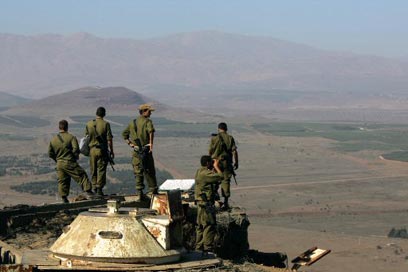
Knesset set to adopt referendum law
After legislation process which lasted years, bill obligating government to hold referendum on any withdrawal from Golan Heights or east Jerusalem expected to pass second and third reading Monday. Some 70 MKs slated to vote in favor of proposal
The bill, which may pose difficulties for a future peace process with the Palestinians or with Syria, is expected to be adopted by the Knesset with a majority of about 70 MKs. The Prime Minister's Office refused to comment on the sensitive issue on Sunday.
MKs have been asked to call off trips abroad and cancel their participation in tours and conferences in order to take part in the vote. The bill's initiator, Knesset Member Yariv Levin (Likud), and his colleagues, have managed to recruit a majority of 80 lawmakers, although some of them are abroad and others may change their mind at the last minute.
The 80 supporters are comprised of 62 Likud, Yisrael Beiteinu and Shas members, seven Labor MKs and 11 Kadima lawmakers. The three United Torah Judaism MKs, who are part of the coalition, are not expected to support the law.
According to a Labor minister, the party ministers fought for essential amendments in the bill and are committed to the ministerial committee's decision, but a final decision would be made at Monday's faction meeting.
The Ministerial Committee on Legislative Affairs approved the bill last month with a majority of seven supporters. Twp ministers voted against the proposal.
According to the bill, if the government approves a withdrawal from territories under full Israeli sovereignty – like the Golan Heights and east Jerusalem – the matter will be brought to the Knesset's approval. If the Knesset's adopts the proposal as well, a referendum will be held within 180 days.
Prime Minister Benjamin Netanyahu's associates managed to include a reservation which would allow room for maneuver: A referendum will not be held if the Knesset approves a withdrawal with a majority of 80 MKs (two-thirds of the Israeli parliament).

Golan Heights to be secured? (Archive photo: AFP)
The private bill, which was initiated by right-wing lawmakers, was submitted three years ago and has even passed its first reading at the Knesset, but has been put on hold ever since.
In December 2009, the Knesset approved a proposal to continue the legislation process from the place it left off. Last month, the Ministerial Committee on Legislative Affairs gave green light for continuing the legislation process.
6-hour discussion, then vote
The Knesset will begin discussing the referendum law at 4 pm Monday. After MK Levin presents the bill, each lawmaker will be given five minutes to voice his or her reservations on any of the bill's clauses. The discussion is expected to last six hours, after which the Knesset will vote on the bill, which is likely to past with a majority of close to 70 MKs.
"I can go on and on about the importance of this law, which must pass with a large majority," said MK Levin. He vowed that the law would unite the nation and prevent "shameful sights and shameful buying of votes, like what happened with the approval of the Oslo Accords."
He added that "the law states that peace must take place between the people and not just between leaders, and this principle should be adopted by us as well as by our neighbors."
Coalition Chairman Zeev Elkin (Likud) said this was a historic law. "The law is very significant, not necessarily for this government, the Netanyahu government. Its major significance is for future left-wing governments which may, God forbid, seek to withdraw from the Golan Heights or harm Israel's sovereignty in the Holy Basin in Jerusalem.
"It will restrict the leader of this government and force him to gain a majority for this difficult move among the Israeli society. This is an appropriate law which aims to defend Jerusalem and the Golan Heights," Elkin added.
The Palestinians, the United States and Europe will likely not be as supportive of the new law.
Attila Somfalvi contributed to this report
- Follow Ynetnews on Facebook










